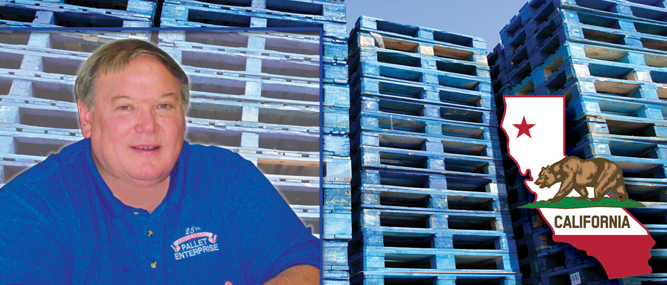A first in the nation, California has passed AB1760, which details recycler rights involving proprietary pallets, including rental pallets. The bill gives recyclers the ability to act if an owner of a proprietary pallet doesn’t arrange for transport/collection in a timely manner. Will this law be a model for other states to consider? It could put more pressure on pallet owners to act faster, pay more and in some cases, collect less-than-truckload quantities of stray pallets.
The bill was passed after extensive lobbying efforts by the North American Pallet Association (NAPA), a group of independent recyclers in California. It provides a blueprint for how independent recyclers can lobby for their rights in other jurisdictions. You can read a copy of the legislation by following this link: https://openstates.org/ca/bills/20212022/AB1760/.
A key provision in the bill sets a time limit of 35 days from the point of notice that a proprietary pallet owner has to reclaim its lost asset or risk having it declared abandoned. At that point, the recycler can do anything it wants with it, from reselling the pallet, grinding it, dismantling it or landfilling the proprietary pallet.
Why is this bill needed? Recyclers contend that, without a time limit, proprietary pallet owners can be slow in collecting strays. This means, in essence, that recyclers are forced to provide free storage and take up valuable space in their pallet yards.
Edgar Montes, a spokesperson for NAPA, commented, “The ball is going to be in our court. It will be easier for us to negotiate with owners of stray proprietary pallets, primarily CHEP, because after 35 days, they can be considered abandoned.”
AB1760 makes it clear that the law is intended to support recyclers and junk dealers that come in contact with “marked, merchandise pallets” in the ordinary course of business, not those who are purposely trafficking in stolen pallets. Montes explained, “We don’t want these pallets. But we end up with them and are then forced to handle them at a measly rate. The average person, when they see how CHEP’s and other rental pallet program work, sees that it is unfair.”
NAPA was able to get this bill passed after extensive outreach with local government officials. Montes said, “After reaching out to government officials and educating them about the issue, we were lucky enough to have support from our local elected leaders.”
AB1760 also provides recyclers the right to require storage fees regardless of when the pallet is picked up by its owner. A proprietary pallet (branded pallet marked with an owner’s logo or name) can’t be sold without first informing the owner and waiting the required 35-day period.
“I authored AB1760 on behalf of the North American Pallet Association (NAPA), a coalition of pallet recyclers and remanufacturers located in my district. They voiced their concerns regarding loss of revenue and declines in their recycling and reuse of pallets as current law does not authorize them to sell or recycle abandoned pallets. AB1760 amends the current law to help alleviate these burdens for our small businesses,” stated Assembly Member Freddie Rodriguez.
CHEP did not comment specifically on the bill. But a CHEP spokesperson said, “CHEP takes ownership rights of its pallets seriously and thus will watch this bill closely.” PECO also refused to comment on AB1760.
The bill does require recyclers to notify proprietary pallet owners and keep records involving those pallets. It goes into effect on January 1, 2023, according to NAPA.
CHEP tweaked its Asset Recovery Program (ARP) earlier this year, its compensation rate schedule for the return or safeguarding of stray assets. But those increases are not enough to keep up with the rate of inflation. Montes noted that CHEP paid $2.25 per pallet for more than a decade before its recent ARP changes. He added, “I think that a fair rate is the cost of cores in a specific market, about $8-10, for example, in California. Many recyclers would also be willing to trade a truckload of cores for a truckload of rental pallets.”
Has the number of blue pallets going to recyclers been reduced since the pandemic? CHEP has suffered supply issues as customers have kept pallets longer. So, it would make sense that CHEP wants them back sooner than later. But the compensation of the ARP has discouraged returns in California, according to NAPA. Montes explained, “A lot of people are refusing to pick up or handle CHEP pallets whenever possible. We think overall CHEP pallets are a nuisance because of the little to no profit margin in handling them. Many recyclers aren’t willing to take them in our area even if they are offered CHEP pallets for free.”
In an effort to keep from creating a black market for their pallets, CHEP and other rental providers have created a disincentive for recyclers and pallet scavengers to handle, transport, sort and store them. Montes further stated, “Small pallet guys are staying away from blue pallets too, for the same reason, because there is no value in them. They are heavy and hard to deal with.”
The new law might actually help rental providers because it allows for storage fee compensation as well as establishes a realistic return window. Maybe this will spur more collecting of stray rental pallets? Interestingly, the law doesn’t say anything about transport, handling, and sorting fees. This is one area that might need to be clarified in the future.
Recyclers around the country will be watching to see how the law impacts the California market. If successful, AB1760 could become a model for other states to consider. It will take organization at a state level because now that AB1760 has passed, CHEP and other proprietary pallet owners may lobby against similar bills in other states.




